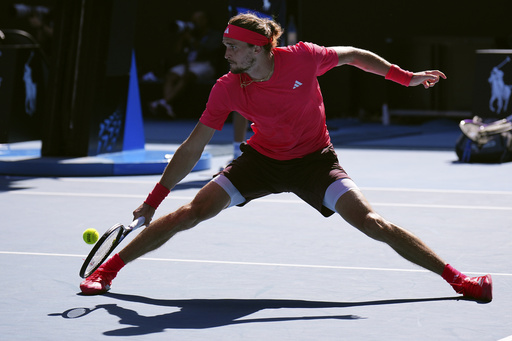
MELBOURNE, Australia — Coco Gauff’s adjustments to her forehand and serve proved to be disastrous at a critical moment during the Australian Open. The issues manifested as a mountain of unforced errors, including numerous double faults and missed break points. Gauff, visibly frustrated, often covered her eyes with her palm or slapped her thigh in disbelief as she battled through the match.
Ultimately, Gauff’s impressive run came to a halt in the quarterfinals at Rod Laver Arena. The reigning U.S. Open champion was bested by Spain’s No. 11 Paula Badosa, with a final score of 7-5, 6-4. Despite a strong build-up, which included a 13-match winning streak that stretched back to late 2022, Gauff could not claim control of the game on a sweltering afternoon.
Coming into the tournament, Gauff had made changes to her coaching staff following a disappointing performance during her title defense in New York last September. The 20-year-old had high hopes for securing a second Grand Slam title in Australia. “At the U.S. Open, I felt like I was playing without solutions, which was frustrating. Today, I felt like I had solutions and knew what to work on. While my serve isn’t quite where I want it, there has been significant improvement and I plan to keep working on it,” Gauff explained.
Despite her defeat, Gauff remains optimistic about her progress, stating, “I believe I’m heading in the right direction. Even with today’s loss, I think my trajectory is upward.” Before the match against Badosa, Gauff had accumulated a perfect 9-0 record in 2025, adding to her momentum from the previous year when she won the WTA Finals.
“There’s still work to do,” she acknowledged after a 1-hour, 43-minute battle. “I’m disappointed, but not utterly crushed.” For Badosa, the match represents a significant breakthrough as she advances to her first Grand Slam semifinal at the age of 27, especially after contemplating retirement due to a stress fracture in her back, which had lingered for an extended period without responding initially to treatment.
“I wanted to give it one last try, and here I am,” Badosa expressed. “I’m incredibly proud of what I and my team have overcome, especially in the mental aspect.” In her upcoming semifinal match, Badosa will face either her close friend, No. 1 Aryna Sabalenka, or No. 27 Anastasia Pavlyuchenkova, the 2021 French Open runner-up, both of whom were set to compete in a later match.
In men’s action, No. 2 Alexander Zverev, a two-time finalist at other Grand Slam events, secured his place in the semifinals by defeating No. 12 Tommy Paul with a score of 7-6 (1), 7-6 (0), 2-6, 6-1. Paul had chances to win both the first and second sets but faltered during critical moments, allowing Zverev to shine in the tiebreakers.
Zverev now awaits the outcome of the much-anticipated quarterfinal battle between Novak Djokovic and Carlos Alcaraz. Djokovic, at 37, is in pursuit of his 11th Australian Open title and a record-setting 25th Grand Slam singles trophy overall, while Alcaraz looks to complete a career Grand Slam by adding an Australian Open victory to his existing accolades from Wimbledon, the U.S. Open, and the French Open.
Badosa’s journey to this point has been fraught with challenges. After an injury sustained during practice at a May 2023 tournament, her new coach, Pol Toledo, noted the struggles they faced: “The back wasn’t responding. We couldn’t find a viable solution, which understandably frustrated Paula.” With the introduction of new medical and training routines, however, Badosa began to see improvements in her condition.
During her match against Gauff, Badosa maintained relentless pressure, forcing Gauff into 41 unforced errors, including six double faults and 28 misfires on forehands. Badosa capitalized on these mistakes by converting four out of ten break point opportunities, while Gauff failed to create any break points until after losing the first set and falling behind in the second.
A critical game marked Gauff’s struggles early in the second set, stretching over a significant 22 points. This prolonged exchange ended with Badosa converting her fifth break point as Gauff faltered on successive forehands. “She excelled in key moments today,” Gauff admitted.
As Badosa closed the match with a powerful forehand winner, she displayed a mix of elation and relief, kneeling as she absorbed the significance of her victory. After previously ranking No. 2 and facing adversity, she now feels she’s reached her full potential. “Emotionally, I wanted this so much,” Badosa reflected. “The freedom I seek won’t come until I win a tournament. It’s just how I am.”

